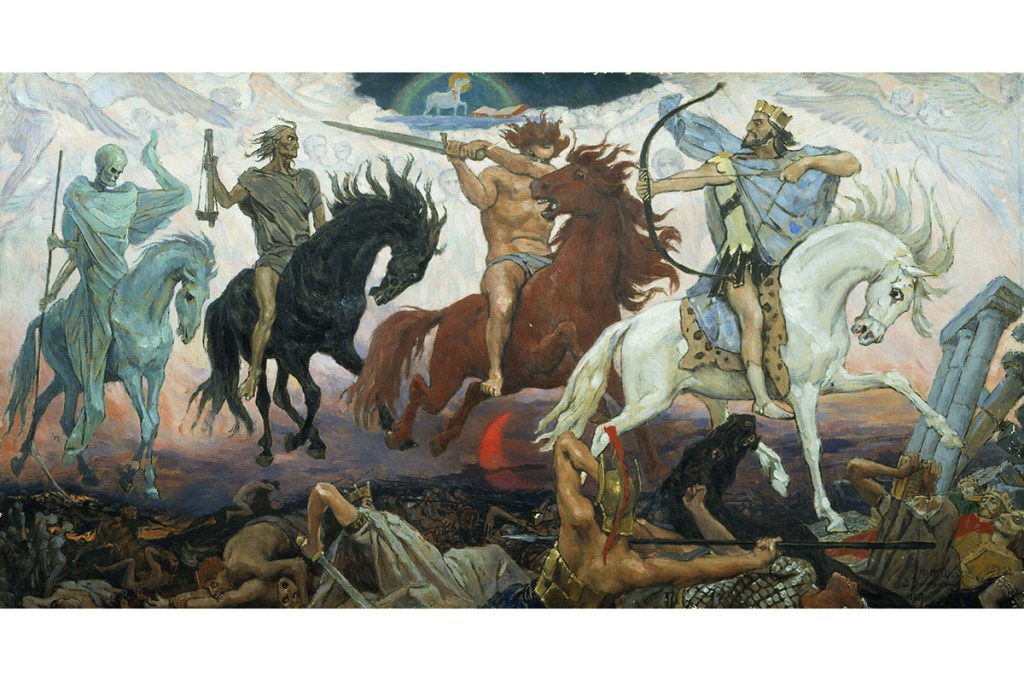The year of our Lord 2020 did not begin auspiciously. In January, a swarm of locusts the size of Manhattan buzzed into east Africa. In Australia, wildfires that consumed 46 million acres and a billion animals reached their peak. In March, a 5.7 magnitude earthquake struck Utah, knocking a trumpet from the hand of a golden statue of the angel Moroni atop Salt Lake Temple. In April, a 2.5-mile asteroid grazed past Earth. And there was something called the coronavirus.
While all that was happening, the US saw a spike in Google searches for the term ‘apocalypse’. A poll commissioned by an evangelical group, the Joshua Fund, found that 44 percent of Americans believe the pandemic and resulting economic catastrophe are a ‘wake-up call’ from God and/or ‘signs that we are living in what the Bible calls the “last days”’.
That’s not altogether surprising: roughly 40 percent of US adults think Jesus will return by 2050, according to the Pew Research Center. Not all of them are Christians: 20 percent of the religiously unaffiliated also believe the Second Coming is near.
Why did God permit the coronavirus crisis? That question is currently exercising our finest theological minds. Might a permatanned ex-wrestler with a droopy mustache have the answer?
‘Word up, can you handle the truth, my brother?’ That was how Hulk Hogan began a recent Instagram post to his 1.5 million followers. He continued: ‘In three short months, just like He did with the plagues of Egypt, God has taken away everything we worship. God said, “You want to worship athletes, I will shut down the stadiums. You want to worship musicians, I will shut down civic centers. You want to worship actors, I will shut down theaters. You want to worship money, I will shut down the economy and collapse the stock market…”’
After quoting Second Chronicles, Hogan applied his finisher: ‘Maybe we don’t need a vaccine. Maybe we need to take this time of isolation from the distractions of the world and have a personal revival where we focus on the ONLY thing in the world that really matters. Jesus.’ Setting aside the false dichotomy — how about a vaccine and a personal revival? — Hogan’s comment was interesting. It expressed a view of mass suffering rarely shared by public figures these days: the belief that God uses catastrophes to offer a kind of course correction.
It was no accident that Hogan quoted from the Old Testament. The idea that God chastises his Chosen People for worshiping false idols is found throughout the Hebrew Bible. That’s just one element of the Hebrew scriptures, of course. There’s another that seems acutely relevant to our times: the conviction that the world has an expiration date. This is found especially in the Book of Daniel, which translator Robert Alter describes as ‘the most peculiar book in the Hebrew Bible’, with its ‘precise numerical indications and mystifying symbolic prefigurations’.
Daniel is a precursor of the New Testament Book of Revelation, which begins, in the Greek text, with the word apokalypsis, meaning ‘unveiling’. Revelation introduces the Four Horsemen of the Apocalypse, commonly identified as Conquest, War, Famine, and Death — which will afflict the world before the Last Judgment. Over the following centuries, Christian thinkers developed a highly refined eschatology, or theology of the last things.
In our secular age, Christian apocalypticism is widely mocked. And yet the most powerful mass movement of our times — environmentalism — has an apocalyptic spirit. Indeed, Greta Thunberg’s speech at Davos in January was entitled ‘Averting a Climate Apocalypse’.
At the same time, mainstream Christianity has shied away from doomsday rhetoric. Faced with the coronavirus crisis, commentators in Christian journals are prone to speak not of God’s judgment, but of prevailing social conditions. ‘Apocalypse,’ they note, means revelation. What the pandemic reveals, they suggest, is the injustice of grocery store workers not being paid sick leave or the moral urgency of a universal basic wage. These may or may not be worthy points, yet it’s striking that these writers are focused on this world rather than the next.
It’s notable that Pope Francis hasn’t used the crisis to seize back some of Christianity’s lost eschatological ground. When he stood alone in St Peter’s Square in the teeming rain to give his Urbi et Orbi blessing in March, he said the coronavirus crisis was not the time of God’s judgment, ‘but of our judgment’. It was, he insisted, ‘a time to choose what matters and what passes away, a time to separate what is necessary from what is not.’
Perhaps he was simply being prudent: if the Pope made the slightest suggestion that we are facing imminent divine judgment, it could provoke mass hysteria or ridicule or both. After all, history shows how easy it is to get carried away by apocalyptic fervor.
***
Get three months of The Spectator for just $9.99 — plus a Spectator Parker pen
***


















